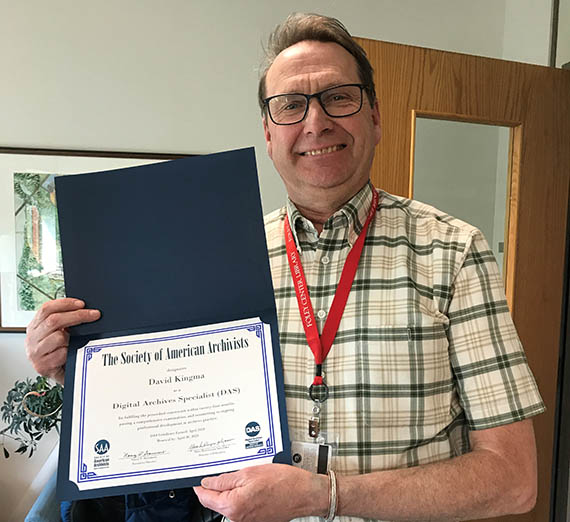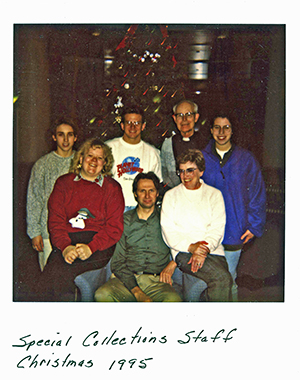Archivist David Kingma Retires

David Kingma, Assistant professor and Archivist, will be retiring from Gonzaga on May 31st. He was hired in November 1994 by the Jesuits to maintain the Jesuit Oregon Province Archives (JOPA) through an agreement between the Oregon Province and Gonzaga. As the first lay archivist for JOPA, he made the collection accessible to students, researchers, and regional Native American communities. David maintained professional standards and ethics for the collection. When it was moved to the Jesuit Archives and Research Center in St. Louis in 2019, he spent more time working with Gonzaga’s archives. He has remained current and active as a scholar in his field, frequently presenting and publishing. David has served on numerous library and campus committees. His impact within Gonzaga includes his collegial spirit in which he is consistently an extremely thoughtful and reflective colleague. Recently, he received Emeritus status. The Foley Library employees will miss him!
When did you start your career as an archivist? And what made you want to be one?
I was a newly minted archivist when hired at Gonzaga, so my career actually began here. My interest was set by being a user of archives while conducting research for my MA thesis. Many of the records I needed were obscure and I was likely the first person ever to have sought them out. So the fact that they were even still available and well-cared for made the profession seem very admirable and interesting.
When did you start working at Foley? What was the library like when you started?
I began in November 1994. The building was only two years old at that point, and I was part of the staffing expansion needed to enact all its new potential. There was a spirit of optimism and camaraderie about bringing the library to a level it had never been before.

How has Gonzaga changed while you have been here?
The biggest change that I notice—perhaps because of my role with JOPA—is the disappearance of an active, substantive role of Jesuits in the life of the university. I suspect we still collectively imagine they are a relevant force, but in reality their absence hasn’t quite yet sunk in.
What has been the biggest change in your profession since you started?
Drafting OPAC-based descriptive records of archival collections in MARC was just beginning to happen when I entered. Then web exposure became the governing concern. But along with the technical changes, an existential drift also seems to have occurred. The grand end of the archival endeavor often seems overshadowed by the wizardry of its means. But then again, that may be a sentiment common to old-timers of most professions.
Do you have any memorable or entertaining stories about your time working in the Foley library?
My first day on the job: Eager to begin, I entered before the doors were opened to the public. Sharon Bissell, a MatMan staff member who didn’t know me from Adam happened upon me wandering around and involuntarily let out a mixture of shriek and gasp. I was hooked from then on, always looking for new ways to elicit that same satisfying sound from Sharon.
When you look back, do you ever think of a certain moment that made you think ‘this, this is why I became an archivist’?
Finalizing order over the chaos of an unprocessed collection never got old. But those moments when a researcher gained a unique and precious insight from a unique and well-organized collection are the best.
What will you miss most about Foley?
Only the finest people are attracted to library work. Teamwork in Foley is remarkable for its spirit of optimism and mutual respect. I’m very grateful for the work environment I’ve known here for so many years.
What are your retirement plans?
My wife left me unattended with a credit card recently, so first off is a quick solo trip to Honolulu in early June. Long range, I hope to have many good years on our beloved 10 acres, tending and planting trees and riding horses.
